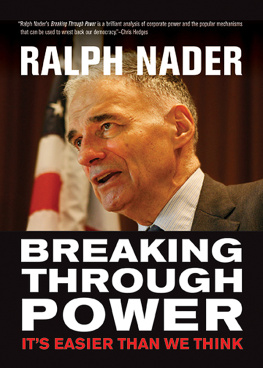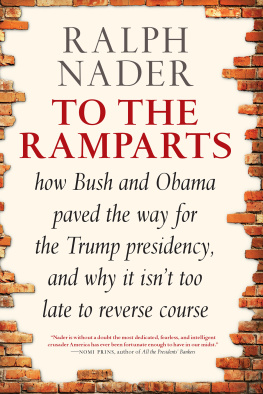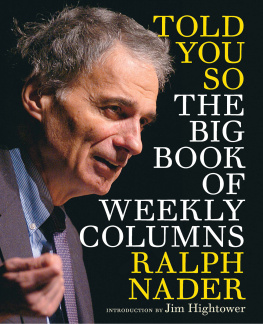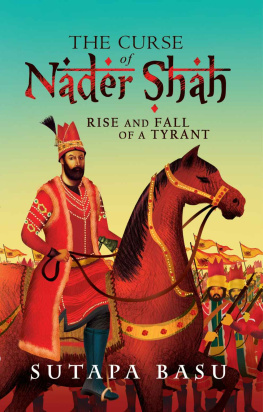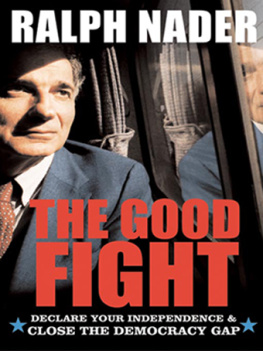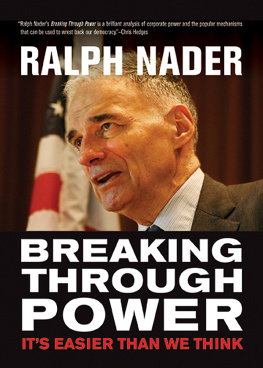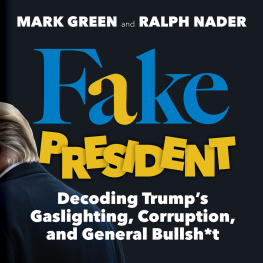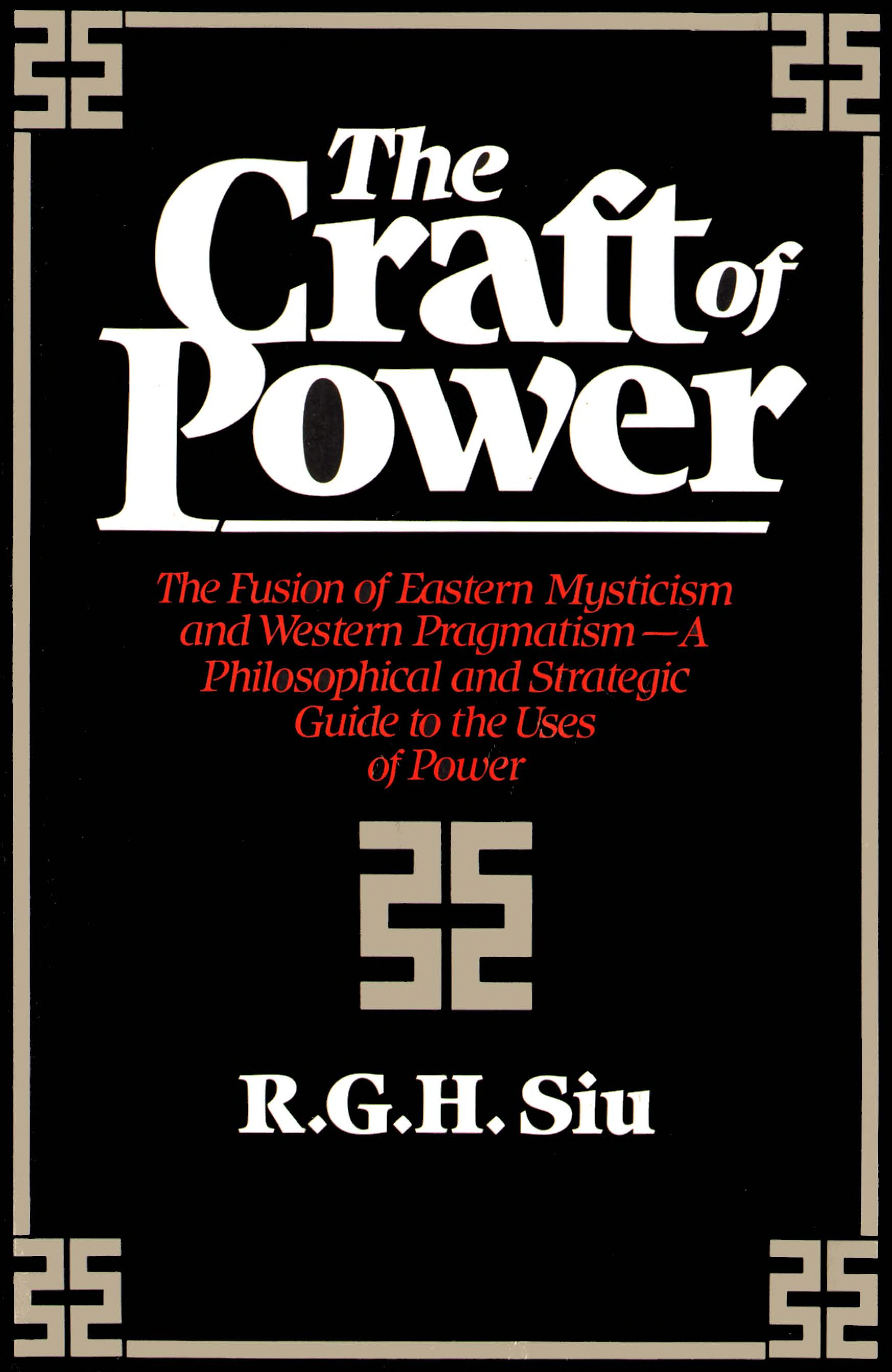Ralph Nader - Breaking Through Power: Its Easier Than We Think
Here you can read online Ralph Nader - Breaking Through Power: Its Easier Than We Think full text of the book (entire story) in english for free. Download pdf and epub, get meaning, cover and reviews about this ebook. year: 2016, publisher: City Lights Publishers, genre: Politics. Description of the work, (preface) as well as reviews are available. Best literature library LitArk.com created for fans of good reading and offers a wide selection of genres:
Romance novel
Science fiction
Adventure
Detective
Science
History
Home and family
Prose
Art
Politics
Computer
Non-fiction
Religion
Business
Children
Humor
Choose a favorite category and find really read worthwhile books. Enjoy immersion in the world of imagination, feel the emotions of the characters or learn something new for yourself, make an fascinating discovery.
- Book:Breaking Through Power: Its Easier Than We Think
- Author:
- Publisher:City Lights Publishers
- Genre:
- Year:2016
- Rating:5 / 5
- Favourites:Add to favourites
- Your mark:
- 100
- 1
- 2
- 3
- 4
- 5
Breaking Through Power: Its Easier Than We Think: summary, description and annotation
We offer to read an annotation, description, summary or preface (depends on what the author of the book "Breaking Through Power: Its Easier Than We Think" wrote himself). If you haven't found the necessary information about the book — write in the comments, we will try to find it.
Breaking Through Power: Its Easier Than We Think — read online for free the complete book (whole text) full work
Below is the text of the book, divided by pages. System saving the place of the last page read, allows you to conveniently read the book "Breaking Through Power: Its Easier Than We Think" online for free, without having to search again every time where you left off. Put a bookmark, and you can go to the page where you finished reading at any time.
Font size:
Interval:
Bookmark:
REVIEWS of UNSTOPPABLE (2014)
Mr. Nader has set out on a formidable mission herenothing less than bringing corporations and government back under effective control of their constituents, and doing so with trans-political and ideological alliances. In effect, he proposes to transform entrenched contemporary politics.
The Washington Times
In Unstoppable, Ralph Nader argues that there are in fact surprising areas of convergence between the left and the right These are profound observations Mr. Nader rails so effectively.
The Wall Street Journal
ALSO BY RALPH NADER
Return to Sender: Unanswered Letters to the President, 20012015
Unstoppable
Told You So: The Big Book of Weekly Columns
Getting Steamed to Overcome Corporatism
The Seventeen Solutions: Bold Ideas for Our American Future
Only the Super-Rich Can Save Us!
The Seventeen Traditions: Lessons from an American Childhood
The Good Fight: Declare Your Independence and Close the Democracy Gap
In Pursuit of Justice: Collected Writings 20002003
The Ralph Nader Reader
Crashing the Party: Taking on the Corporate Government in an Age of Surrender
Canada Firsts
Unsafe at Any Speed: The Designed-In Dangers of the American Automobile
BREAKING THROUGH POWER
Its Easier than You Think
Ralph Nader

Open Media Series | City Lights Books
Copyright 2016 by Ralph Nader
Open Media Series Editor: Greg Ruggiero
Library of Congress Cataloging-in-Publication Data
Names: Nader, Ralph, author.
Title: Breaking through power : its easier than we think / Ralph Nader.
Description: San Francisco : City Lights Publishers, 2016. | Series: City lights open media
Identifiers: LCCN 2016008227 | ISBN 9780872867055 (paperback)
Subjects: LCSH: DemocracyUnited States. | CommunitiesUnited States. |
Power (Social sciences)United States. | WealthUnited States. | Social justiceUnited States. | BISAC: POLITICAL SCIENCE / Economic Conditions.
| POLITICAL SCIENCE / Political Ideologies / Democracy. | POLITICAL
SCIENCE / Civics & Citizenship. | POLITICAL SCIENCE / Public Policy /
Economic Policy.
Classification: LCC JC423 .N245 2016 | DDC 322.40973dc23
LC record available at https://lccn.loc.gov/2016008227
City Lights Books are published at the City Lights Bookstore
261 Columbus Avenue, San Francisco, CA 94133
www.citylights.com
To all citizens who wish to better the world and are seriously willing to dedicate some of their time, talent and resources to advance important causes.
I wish to acknowledge the sagacious assistance of Dr. Claire Nader and especially the dedicated attention to overall substantive details of my responsive editor, Greg Ruggiero, who proposed the books approach.
I am also grateful to John Richard and his associates, Hunter Jones and Frank Garvey, for factchecking and proofreading.
Ralph Nader
When I was a student at Princeton University I learned from my anthropology studies that the concentration of power in the hands of the few is common to all cultures, societies, nations, tribes, cities, towns, and villages. Even where the thirst for self-governance and democracy is strong, as was the case in New England towns before the American Revolution against King George III, wealthy Tories were there too. In Central and Western Massachusetts, the farmers used the term the River Gods to describe the rich merchants using the Connecticut River as a profitable trading route. These days, most people protesting for economic justice use the term the One Percent to describe the ultra-small group of people who wield enormous influence over our society today.
There is something about the differences in skill, determination, lineage, avarice, and pure luck that stratifies most people from the rulers who dominate them. In the political realm, the few become dominant because they hoard wealth and are driven to exercise power over others. When a small group of people rules a society the political system is considered an oligarchy; when only money and wealth determine how a society is controlled, the political system is a plutocracy. From the standpoint of a democratic society, both oligarchy and plutocracy are inherently unjust and corrupt.
Of course there are variations in the degrees of authoritarianism and cruelty that each system exercises over the communities it relies upon for workers and wealth. Scholars have resorted to using phrases like benign dictatorships or wise rulers or paternalistic hierarchies to describe lighter touches by those few who impose their rule over the many. Thomas Paine simply called them tyrannies. People, families, and communities can only take so much abuse before they rise up to resist. The job of the rulers is always to find that line and provide the lowest level of pay, security, housing, consumer protection, healthcare, and political access for society so that they can extract and hoard the greatest amount of wealth, power, and immunity from justice for themselves. In many ways, the majority of Americans live in a democracy of minimums, while the privileged few enjoy a plutocracy of maximums.
This small volume is not just about the ravages of power or the assaults against disadvantaged and downtrodden communities. The subject here is the dominating influence of the One Percent in business, politics, health, education, and society as a whole. Over the past fifty years, Americans have suffered the relentless commercialization of everyday lifetheir privacy and their childhoods, their parks and prisons, their public budgets and foreign policy, their schools and religious institutions, their elections and governments, and the most basic societal institution of them all: the family.
Consider all the family functions that have been outsourced to business. Eating, cleaning, childcare, counseling, therapy, entertainment, sports, lawn work, simple repairs, have been increasingly commercialized, commodified, packaged, and marketed back to us as products of luxury and convenience. Even mothers breast milk has been displaced by infant formula.
In a plutocracy, commercialism dominates far beyond the realm of economics and business; everything is for sale, and money is power. But in an authentic democracy, there must be commercial-free zones where the power of human rights, citizenship, community, equality, and justice are free from the corrupting influence of money. Our elections and our governments should be such commercial-free zones; our environment, air, and water should never fall under the control of corporations or private owners. Children should not be programmed by a huckstering economy where their vulnerable consciousness becomes the target of relentless corporate marketing and advertising.
American history demonstrates that whenever commerce dominates all aspects of national life, a host of ills and atrocities have not just festered and spread, but become normalenslavement, land grabs, war, ethnic cleansing, serfdom, child labor, abusive working conditions, corrupt political systems, environmental contamination, and immunity from the law for the privileged few. History also shows that whenever there have been periods when enough of the country organizes and resists, we see movements of people and communities breaking through power. Progress is made. Rights are won. Education and literacy increase. Oppression is diminished. It was in this manner that people of conscience abolished the living nightmare imposed by the laws and whips of white enslavers. The nation moved closer to promises of Life, Liberty, and the Pursuit of Happiness expressed in the Declaration of Independence. We won more control over our work, our food, our land, our air, and our water. Women secured the right to vote. Civil rights were elevated and enforced. Public schools, improved environments, workplace collective bargaining, and consumer protections did not spontaneously evolve; they were won by people demanding them and breaking through power.
Font size:
Interval:
Bookmark:
Similar books «Breaking Through Power: Its Easier Than We Think»
Look at similar books to Breaking Through Power: Its Easier Than We Think. We have selected literature similar in name and meaning in the hope of providing readers with more options to find new, interesting, not yet read works.
Discussion, reviews of the book Breaking Through Power: Its Easier Than We Think and just readers' own opinions. Leave your comments, write what you think about the work, its meaning or the main characters. Specify what exactly you liked and what you didn't like, and why you think so.

